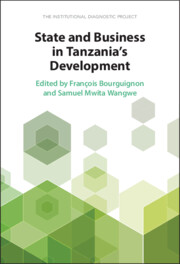Acknowledgements
Many people helped us in completing this institutional diagnostic of Tanzania by giving us advice on how to proceed, hints on some key issues, and comments on various drafts of the study. However, two of them deserve special mention both because of their contribution and their unexpected deaths during the COVID-19 pandemic.
First, we would like to pay tribute to Benno Ndulu, former governor of the Bank of Tanzania and member of the scientific committee of the Economic Development and Institutions (EDI) research programme, who suggested that Tanzania could be the pilot study of the Institutional Diagnostic Project. He accompanied us throughout the whole study with his support, advice, and comments. Benno was a major figure among African economists. He was also a dear friend of the two editors of this volume. We are sorry he is not with us at the time this volume is published.
Second, we would like to honour the memory of Servacius Likwelile, former finance permanent secretary, who was also an early supporter of the Tanzania Institutional Diagnostic and co-authored one of the chapters. It was a continuous pleasure to work with him, and we are sad he will not be with us to share the satisfaction of the final publication.
We next need to acknowledge the precious help the editors and authors of this study received from many friends and colleagues. First, we would like to thank Katie McIntosh, who was the representative of Oxford Policy Management (OPM) in Dar es Salaam at the time this study was started and followed it on behalf of OPM from the beginning to the very end, not only making sure that drafts were handed over in time and organising meetings, workshops, and seminars, but also reading the various chapters and making judicious comments on them. This study would not have been completed without Katie’s professionalism, devotion, and friendliness. Thanks again, Katie.
Another special debt has to be addressed to Honourable Judge Joseph Warioba, former prime minister and vice president, whose guardianship of and advisory role on this work ensured it was of high quality, informed by a diverse set of viewpoints, and situated in the reality of the Tanzanian context.
The members of the Scientific Committee of EDI’s institutional diagnostic research activity, the late Benno Ndulu, Louis Kasekende, Lemma Senbet, Célestin Monga, Romain Houssa, Ravi Kanbur, and Umar Salam, as well as EDI’s co-research director Jean-Philippe Plateau, must also be acknowledged for the crucial role they played in critically challenging the process and conclusions of the study, pushing authors to produce meaningful, high-quality research.
We must also acknowledge the EDI team members who contributed valuable insights and a management function to the process, including Mark Henstridge, Yasmina Yusuf, Benjamin Klooss, Vinayak Uppal, Stevan Lee, Rachel Smith- Phiri, Umar Salaam, Tatiana Goetghebuer, and Ombeline de Bock. We would specifically like to acknowledge Kaley Milao for her coordination support to the team of authors and organisation of key events, including the Arusha workshop in January 2018.
Policy Research for Development, and specifically Cornel Jahari and Abel Kinyondo, must also receive a very special acknowledgement for partnering with the EDI programme on the implementation and analysis of the Country Institutional Survey, which is featured in Chapter 2.
There remain a few individuals whom we must single out for their contributions to the thinking and analysis underlying the Tanzania Institutional Diagnostic. We would like to acknowledge Godson Nyange for his support in facilitating key meetings and providing valuable advice and reflection throughout the study. Josaphat Kweka and Donath Olomi must be acknowledged for providing valuable reflections on the design and analysis of the survey, as well as Tausi Kida and Moses Kusiluka for their contributions to the Arusha workshop discussions in January 2018. We are also grateful to Andrew Coulson, the author of several books on the political economy of Tanzania, for insightful comments on a former version of this study.
We are extremely grateful to all those who met us along the Tanzania Institutional Diagnostics journey to provide their reflections and challenge us to consider a variety of issues. We would like to express a special thank you to former presidents Benjamin Mkapa and Jakaya Kikwete for their insightful reflections on Tanzania’s development, particularly during their years in the presidency. We are grateful to past and present government officials who made time to speak with us, including Philip Mpango, Servacius Likwelile, Omari Issa, Neema Nduguru, Alphayo Kidata, Lordship Othman Chande, Mussa Juma Assad, Valentino Longino Mlowola, Adolf Mkenda, Wilfred Mbowe, Felix Ngamlagosi, Godfrey Chibulunie, Msafiri Mtepa, Mathias Kabunduguru, Maduka Kessy, Matern Lumbanga, Stephen Wasira, and Pius Msekwa. We acknowledge Zitto Kabwe and Ibrahim Lipumba for their comments.
We thank members of the private sector who contributed to a diversity of viewpoints, including Leodegar Chilla Tenga, Ali Mufuruki, Mohammed Dewji, Shabir Abji, John Wanyancha, and Patrick Rutabanzibwa.
We are grateful to a large group of researchers, academics, and others whose critical challenge function must be acknowledged. This includes Donald Mmari, Kasim Kulindwa, Vincent Leyaro, Jehovaness Aikaeli, Joseph Semboja, Dennis Rweyemamu, Issa Shivji, Ringo Tenga, Alphonce Tiba, Remidius Ruhinduka, Brian Cooksey, Aidan Eyakuze, Kees de Graaf, Risha Chande, Alex Makulillo, Richard Sambaiga, Bruce Heilman, William John, Bashiru Ally, Wilfred Kahumua, Stephen Kiraura, and Onejumo Selijio.
Finally, we must acknowledge the representatives from international organisations and donors in Tanzania who provided useful insights along the way, including Bella Bird, Yutaka Yoshino, Denis Biseko, Vel Gnanendran, Thomas Allan, Jean-Paul Fanning, Nick Lea, John Wearing, Francis Samba, Thomas Baunsgaard, and Virginie Ruyt.
This project was funded with aid from the UK government.

